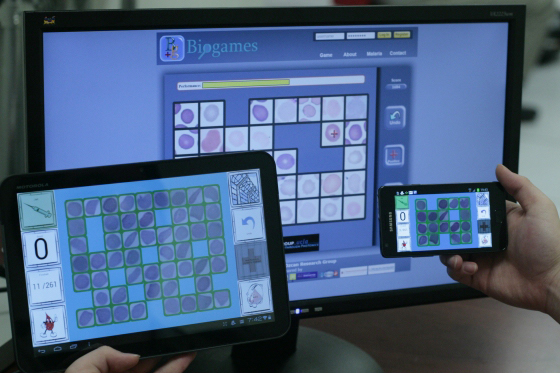Case study: _Internet game aims to improve malaria diagnostic process_

UCLA NEWSROOM
A new Internet game introduced last week by a UCLA engineering research group allows users to diagnose malaria in red blood cells.
By Elizabeth Case
May 11, 2012 2:55 a.m.
Click. One malaria cell dead.
Click, click, and I took down two more.
The midterm crunch had arrived ““ so of course, I was playing games online at midnight in the Powell Library Reading Room. But at least I could feel good about my procrastination: I was also diagnosing malaria in red blood cells by playing a new Internet game introduced last week by a UCLA engineering research group.
Sam Mavandadi, a postdoctoral scholar in the UCLA Biophotonics Laboratory, and Aydogan Ozcan, an associate professor of electrical engineering who runs the laboratory, came up with the idea two years ago. The goal is to see if ordinary people can give accurate diagnoses, and to make the diagnostic process more efficient, he said.
Though the game is still in its preliminary trials and uses sample cells from the Center for Disease Control and Prevention, Mavandadi hopes it can eventually be used to diagnose real cases of malaria from all around the world.
The biophotonics laboratory is part of the larger Ozcan Research group, which specializes in creating technologies to improve telemedicine ““ the practice of providing medicinal information from afar, often over the Internet.
The game itself is simple and can be accessed by the public through the group’s website. A five-step instructional walkthrough shows users how to play, and gives an idea of what an infected cell looks like.
During the game, users are given sets of 24 cells. Players destroy infected cells by clicking on them.
Once it looks like the malaria has been eradicated, the user can move on to a new set of cells.
The computer assesses user achievement by comparing the responses to a set of control cells that have already been positively or negatively diagnosed by an expert pathologist. Users can see their score and average performance, which changes based on the number of controls a player accurately identifies.
“(The goal) is to find the correct diagnosis based on imperfect answers,” Ozcan said.
My performance bar hovered between yellow and red, meaning I was diagnosing more than half of the cells incorrectly. It’s a good thing I’m a physics student, and not headed to medical school.
Mavandadi said malaria is an ideal candidate for this kind of gaming platform because there are only two possible diagnoses: disease or disease-free. Additionally, Mavandadi targeted malaria because it is frequently misdiagnosed.
Malaria is especially rampant in sub-Saharan Africa and India, where people often don’t have access to trained pathologists or clinics. Without the ability to efficiently diagnose patients, doctors, nurses and other care providers often err on the side of positive diagnoses and give medication to patients who may not have the disease.
Crowdsourcing looks like it might be a way to cheaply and effectively diagnose malaria ““ by averaging user answers together, cells were diagnosed within 1 to 2 percent of the error rate of an expert.
Steve Feng and Frank Yu, two electrical engineering graduate students who worked on the game, said the next step is to integrate it with social media. They are looking to develop a Facebook version of the game, as well as add a comment section and individual statistics.
Both Mavandadi and Ozcan said they hope they can eventually expand this platform to address more than just malaria.
“Whenever you have a slide of tissue or liquid samples, you can use this game to diagnose,” Ozcan said.
These include other parasitic diseases and pap smears, which are used to identify pre-cancerous or cancerous cells in female reproductive systems.
Since its release on May 3, more than 1 million cells have been diagnosed, and the game has been featured on Internet aggregation sites such as Slashdot and Reddit.
That night in Powell? I diagnosed around 100. Not bad, for a half-hour of procrastination.
Play the game yourself at biogames.ee.ucla.edu and let Case know how many cells you diagnosed by emailing [email protected]


